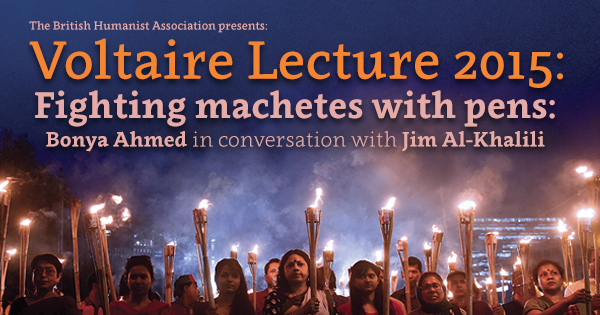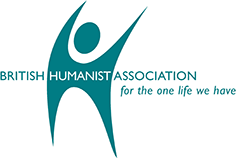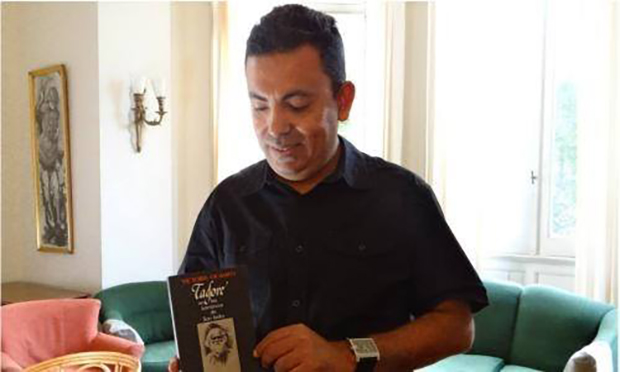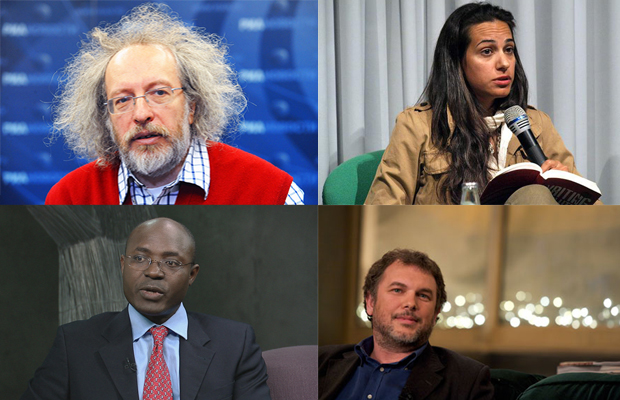31 May 2015 | Events

On 26 February this year, Bonya Ahmed and her husband Avijit Roy, both humanist bloggers, were visiting the national book fair of Bangladesh. Just outside Dhaka University, they were attacked with machetes by Islamic fundamentalists. Ahmed was severely wounded and Roy himself was killed.
In the British Humanist Association’s 2015 Voltaire Lecture, Ahmed will make her first public appearance since her husband’s murder to speak about her life with Roy and their struggle for humanism and secularism in Bangladesh and elsewhere.
Although shaken, Ahmed has sworn to continue the struggle against censorship and violence. She recognises her husband’s murder as “a crime not only against a person, but against freedom of speech and humanity”, and she is determined that those behind the attack do not succeed.
Hosted by BHA President Jim Al-Khalili.
When: Thursday 2nd July, 7:30pm (doors 7:00pm)
Where: Hilton London Metropole Hotel, W2 1JU (nearest tube Edgware Rd)
Tickets: £9 (Index supporters eligible for BHA member rate). Book here.
Presented by

16 Apr 2015 | Asia and Pacific, Bangladesh, mobile, News

Blogger Avijit Roy was murdered in February. (Photo: Avijit Roy/Facebook)
Washiqur Rahman was murdered because he didn’t believe in God.
On the morning of 30 March 2015, the 27-year-old was set upon by three machete-wielding attackers and hacked to death because he did not believe in God.
The previous month, 42-year-old Avijit Roy was murdered because he didn’t believe in God.
One of the accusations most often levelled at self-proclaimed atheists is that they go on about it too much. What is there even to talk about? Why join, say the British Humanist Association or a university atheist group? What do you do? Go to meetings and drone on about not believing in God? And someone should just get that Richard Dawkins off Twitter, right?
Rahman and Roy were the kind of vocal atheist that tends to prompt eye-rolling in liberal secular countries.
Roy was a frontrunner, a star. He was the creator of Mukto-Mona, which claimed to be the first secular humanist web portal in South Asia. He described Mukto-Mona’s mission as “to build a society which will not be bound by the dictates of arbitrary authority, comfortable superstition, stifling tradition, or suffocating orthodoxy but would rather be based on reason, compassion, humanity, equality and science.”
Based in the US, Roy had returned to Bangladesh to visit his sick mother, despite warnings that the country was no longer safe for him. He was well-known enough to be stopped in the street for autographs. An appearance at a book fair in Dhaka had alerted Islamist extremists to his presence in the country.
Rahman was an up and coming blogger with a big Facebook following. He wrote under the name Kutshit Hasher Chhana (The Ugly Duckling), satirising religion and believers. Like many online activists, he had been horrified by the murder of Roy, and had lent support to a campaign calling for the prosecution of his killers, posting to the #IAmAvijit hashtag.
This, it seems, was enough to get him killed. Suspicion for the killings of both bloggers lies with the Ansarullah Bangla Team, an extremist organisation said to take inspiration from Anwar al-Awlaki, the American preacher killed by a US drone attack in 2011. The group, which was formed in 2013, has been implicated in the murder of atheist blogger Ahmed Rajib Haider in February of that year. The organisation recently hit the headlines in Bangladesh after it called for a jailbreak to free prisoners tied to Jamaat-e-Islami, who are on trial for war crimes that took place during Bangladesh’s war for independence from Pakistan.
The International Crimes Tribunal has been the backdrop for a fraught few years in Bangladesh. The tribunal has been criticised for lacking impartiality, particularly after leaked Skype conversations between the presiding judge, Mohammed Nizamul Huq, and a war crimes activist were published by The Economist, via Oliullah Noman, a journalist for opposition newspaper Amardesh in December 2012.
Increasing divisions were exacerbated by the governing Awami League’s decision to abandon the usual protocol of making way for an interim government to oversee the January 2014 election. The main opposition, the Bangladesh Nationalist Party, boycotted the election in protest, and the Commonwealth, the EU and the US declined to send monitors, calling the legitimacy of the result into question. The political division in Bangladesh operates roughly on a secular/religious line, with the Awami League seen as more secular and the BNP representing a more religious viewpoint.
Amidst all this upheaval, online atheists are under pressure. The two murders this year followed the attacks in 2013. Meanwhile, in spring 2013 four secularist bloggers were arrested for “offending religious sentiment” by denigrating the Prophet Mohammed, a colonial era law which is the closest Bangladesh comes to an official blasphemy statute.
Bangladesh is not Pakistan. It retains a secular identity that is fast slipping (it’s hard now to imagine a Pakistani atheist blogger operating for 13 years, as Roy did). But it cannot be entirely immune to the cross-border influences of extremist Islamism and jihadism unless it protects the free expression of non believers.
That is why the reaction to the murder of Washiqur Rahman from the deputy commissioner of the Dhaka Metropolitan police made depressing reading:
“Those who killed him differed on his ideologies about religion. He was not an atheist. He was a believer. But the way he followed religion was different from the way radical groups insist,” Biplob Kumar Sarkar told the Guardian.
Though Sarkar may have been attempting to calm the situation, the statement is a gross display of disrespect to the murder victim and his views.
Moreover, it’s a refusal to confront the prime motivation for his killing, and that of Ajivit Roy. They were killed because they were atheists who refused to keep quiet about their beliefs.
Washiqur Rahman was murdered because he didn’t believe in God.
Avijit Roy was murdered because he didn’t believe in God.
This column was posted on 16 April 2015 at indexoncensorship.org
27 Feb 2015 | Bangladesh, Campaigns, Statements
Index on Censorship condemns the brutal murder of US-Bangladeshi blogger Avijit Roy. Roy, an atheist who advocated secularism, was hacked to death by a knife-wielding mob in Dhaka as he walked back from a book fair.
Index CEO Jodie Ginsberg said: “Our sympathies are with the family of Avijit Roy. Roy was targeted simply for expressing his own beliefs and we are appalled by his death and condemn all such killings.”
17 Feb 2015 | Awards

This week we will be showcasing our shortlisted nominees from the journalism category. This year’s nominees include Lirio Abbate, an Italian journalist whose investigations into the mafia mean he requires round-the-clock police protection; Safa Al Ahmad, whose documentary exposed details of an unreported mass uprising in Saudi Arabia; radio station Echo of Moscow, one of Russia’s last remaining independent media outlets; and Rafael Marques de Morais, an Angolan reporter repeatedly prosecuted for his work exposing government and industry corruption.
Tuesday: Documentary maker Safa Al Ahmad
Wednesday: Investigative journalist Lirio Abbate
Thursday: Journalist and human rights activist Rafael Marques de Morais
Friday: Radio station Ekho Moskvy
In 2014 Azerbaijani newspaper, Azadliq, picked up the award for this category. In the past, winners have included Greek investigative journalist Kostas Vaxevanis; Idrak Abbasov, Azerbaijan; Egyptian editor, Ibrahim Eissa; Radio La Voz, Peru; Ski Lankan newspaper The Sunday Leader; Arat Dink, editor of Turkey-based Armenian newspaper, Agos; Egyptian blogger Abdul Kareem Suleiman Amer; Sihem Bensedrine, Tunisia; Sumi Khan, Bangladesh; and Pulitzer Prize winning photo-journalist Kaveh Golestan, who was killed by a landmine in Northern Iraq in 2003.
In 2003, internationally recognised journalist Fergal Keane was the first to win an award under the journalism category, however, the previous year Russian journalist Anna Politkovskaya, who was killed in 2006, won the Defence of Free Expression award. In 2001 the same award was given to Iranian journalist, Mashallah Shamsolvaezin.




